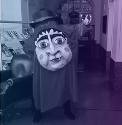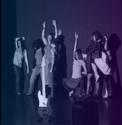‘TRAINING UTOPIAS’ - proposal deadline approaching

15 March 2020 is the deadline for proposals for
Vol. 25, No. 8: ‘TRAINING UTOPIAS’ (December 2020).
Issue editors:
Felipe Cervera, LASALLE College of the Arts, Singapore
Elizabeth de Roza, LASALLE College of the Arts, Singapore
Michael Earley, LASALLE College of the Arts, Singapore
‘For those of us whose relationship to popular culture is always marked by aesthetic and sexual antagonism, these stages are our actual utopian rehearsal rooms, where we work on a self that does not conform to the mandates of cultural logics such as late capitalism, heteronormativity, and, in some cases, white supremacy’. José Esteban Muñoz (2009), Cruising Utopia: The then and there of queer futurity, p.111
Training is utopic. In principle, we train to become, to improve, to upgrade or simply, to be better. Who determines what is this ‘better’? We train in various ways and forms, and our training utopias are multiple and different. We train to become citizens, artists, educators as much as we also train in the military, camps and corporations. The world is made in the entanglement of multiple utopias and the trainings they demand. However, the materiality of the world and of the body are often a mismatch to the vision any training predicates. Indeed, the milieu in which a training system is implemented may amplify or undermine its practice. In the moment of implementation, utopian visions are also disturbed by the same socio-cultural milieu that shaped their imaginary. The tension between thinking and doing training is where the world happens. We train to embody multiple non-places in their utopic unbecoming. And yet, we continue to train and be trained.
Places, venues and institutions of training may be taken as heterotopias (Foucault 1967). In these places, the meaning of having a body has historically changed in relation to the function that the space is attributed within larger sociologies of practice. Sometimes, these places host the training needed for military, corporate and social engineering. In other times, however, they host practices that aim to explicitly contest a given spatial and temporal normativity. In theatre and performance, training venues have often been thought of along these lines, as a place that unsettles the normative spatial and temporal logics, and where intense training can take place and utopic attitudes maintained. Examples abound – especially during the twentieth century: Edward Gordon Craig’s short-lived training school at the Arena Goldoni in Florence (1912–13), the Staatliches Bauhaus, Kerala Kalamandalam, Moscow Art Theatre studio, the Group Theatre, Black Mountain College, various lab theatres modelled on Grotowski’s Polish Lab Theatre and Odin Teatret and Tadashi Suzuki’s training centre in Toga are but a few examples of a long list of training utopias, some short-lived and some continuing.
The histories and geographies (or non-histories and non-geographies) of these training places were the mirrors of utopian thought in the context of twentieth-century cosmopolitanisms and globalizing processes. In hindsight, however, we can appreciate that, even when utopic, many of the conceptual pillars of these examples failed to envision the dystopic future we experience today and each, in their own way, broke down or may have outlasted themselves. For example, twentieth-century intercultural training cannot be disassociated with its necessity for air travel and therefore with its carbon footprint. Moreover, its practice did not take into consideration the authorship of the trained body. In contrast, and as it has been widely discussed, its epistemology privileged a Eurocentric authorship that in turn contributed to geopolitics of training shaped by tendentious cultural diplomacy and exchange. This determined that the dynamics of the rehearsal space or studio limited the possibilities of transversal fluidity, and therefore of collective performance utopias. The trained body became, by proxy, the agency of the trainer’s knowledge, expertise or cultish appeal – their personal brand in a global network of elite travellers.
The utopia of training itself is in an impasse. What conversations do we need to have, at this historical and geothermal moment, to recover training from the hands of identitarian idealisms and naive pedagogies? What is the future of training in a time where the future is in crisis? What becomes of the trained body in the moment of planetary terminus? What is contemporary performance training in light of new materialist thought, post-globalisms, decolonial and hierarchical critiques, gender fluidity and spectrums, and post-human theories? How can we unsettle and maybe reset the authorship of our utopias? We cannot deny that training and authority exist hand in hand. What, then, becomes of the relationship status between teacher and student, master and disciple, in a moment when the authorship in and of the body so urgently needs a revision in relation to twenty-first century conditions? Is there room to propose a new training utopia?
This issue of Performance Research will look into the concept of training utopias. Contributions will include discussions on theatre and performance training but also training more generally as it evolves into an economic indicator and ecological necessity in post-industrial and late capitalistic societies.
Proposal topics may include:
- Histories of performance training and their connection to utopia and hope
- Para-training
- Critique of hegemonic discourses in actor training
- Decolonizing the conservatoire
- The tyranny of tradition
- Comparative perspectives in training
- Training manifestos
- New materialisms and performer training
- Planetary training and the future of cross-cultural training
- Digital and mediated training
- Training in/for the Fourth Industrial Revolution
References:
- Foucault, Michel (1986) ‘Of other spaces’, trans. Jay Miskowiec, Diacritics (16): 22–7.
- José Esteban Muñoz (2009) Cruising Utopia: The then and there of queer futurity, New York: New York University Press.
We are inviting essays of approximately 4,000 to 6,000 words and artist/trainer methodology pages (number of pages to be agreed with the editors). Please send 300–400-word abstracts plus a 100-word bio.
Schedule:
Proposals: 15 March 2020
First drafts: 1 June 2020
Final drafts: 15 August 2020
Publication: December 2020
All proposals, submissions and general enquiries should be sent direct to Performance Research at: info@performance-research.org
Issue-related enquiries should be directed to the issue editors:
Felipe Cervera, LASALLE College of the Arts—felipe.cervera@lasalle.edu.sg
Michael Earley, LASALLE College of the Arts—michael.earley@lasalle.edu.sg
Elizabeth de Roza, LASALLE College of the Arts—elizabeth.roza@lasalle.edu.sg
General Guidelines for Submissions:
- Before submitting a proposal, we encourage you to visit our website (www.performance-research.org ) and familiarize yourself with the journal.
- Proposals will be accepted by email (Microsoft Word or Rich Text Format (RTF)). Proposals should not exceed one A4 side.
- Please include your surname in the file name of the document you send.
- Please include the issue title and issue number in the subject line of your email.
- Submission of images and other visual material is welcome provided that all attachments do not exceed 5 MB and there is a maximum of five images. Copyright clearance remains the responsibility of the author.
- Submission of a proposal will be taken to imply that it presents original, unpublished work not under consideration for publication elsewhere.
- If your proposal is accepted, you will be invited to submit an article in first draft by the deadline indicated above. On the final acceptance of a completed article you will be asked to sign an author agreement in order for your work to be published in Performance Research.





